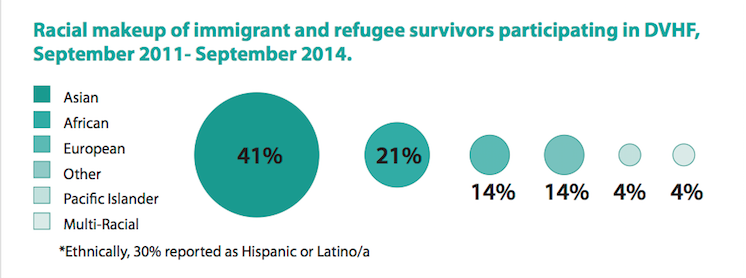Domestic Violence Housing First (DVHF) eliminates housing as a reason for survivors to stay in an abusive relationship. The program’s flexible advocacy, temporary financial assistance and housing assistance within a cultural context supports survivors in choosing how to best rebuild their lives.
From September 2011– September 2014, 681 survivors participated in the DVHF program. 22% of these survivors identified as an immigrant or refugee.
Immigrant and refugee survivors faced high barriers to housing and economic stability
Limited income: 53% of survivors who identified as immigrant or refugee had a monthly income of $800 or less. 70% were unemployed at program entry, compared to 44% for non-immigrant and refugee survivors.
Fewer economic opportunities: 77% of immigrant and refugee survivors had Limited English Proficiency, compared to 1% for non-immigrant survivors. Survivors reported Limited English Proficiency as a main reason they could not find employment.
Greater housing instability: Though immigrant and refugee survivors were less likely to be homeless at program entry (9% compared to 18% for non-immigrant or refugee survivors), they were more likely to have been to an emergency domestic violence shelter in the past (39% compared to 30%), and more likely to have been in transitional housing (21% compared to 2%).
DVHF has proven effective in supporting immigrant and refugee survivors to become safe, stable, and empowered to create lives free from violence.
Access to housing: Limited access to information provided only in English, inadequate interpretation, fear of deportation, and not qualifying for housing and food resources due to lack of correct documentation can make it difficult for immigrant and refugee survivors to achieve stability.
DVHF programs have found creative ways to ensure that survivors have access to housing by master leasing apartments and developing strong relationships with private landlords. Additionally, flexible financial assistance covers costs such as legal fees, food, English classes, utility costs, and rental payments that are often not met by any other sources.
Re-establishing social networks and community: Many immigrant and refugee survivors have difficulty finding safe housing from the abuser without losing connection to their cultural community and extended family. Advocates work with survivors to improve their social networks and reduce isolation by helping them locate housing in the community of their choice and re-establish or create new connections to a community.
When I came here…my future opened again. The advocate told me, ‘Whatever you are going through, we can support you’.
DVHF Program Participant
Navigating mainstream systems: DVHF makes it possible for advocates to adapt services to address the specific needs of immigrant and refugee survivors. Advocates help navigate complex mainstream systems such as housing and employment that are often difficult to access, particularly if English is not a survivor’s first language.
There is complexity in the needs of survivors, and there is complexity in systems. And how do you get these two things to come together? That’s where advocates come in.
Director, DVHF Cohort Program
Culturally responsive services: Immigrant and refugee survivors reported that working with an advocate who culturally and linguistically understands them was critical to getting the support they needed to become stable. Culturally-specific programs allow survivors from various cultures to feel comfortable, understood, and accepted by the agency and advocate.
You always feel comfortable with your own people. They understand you.
DVHF Program Participant
